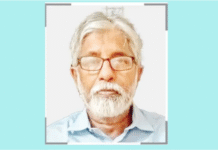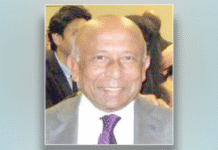The rise of the Islamic State or IS has had an impact, both direct and indirect, on global politics as a whole and well as on the internal politics of individual countries. There have been overt attacks and covert campaigns, and almost all countries are now having to regularly face new challenges of countering terrorism. And no one can claim to have achieved absolute success in these efforts.
It is hardly conceivable that anyone can contemplate on political compromise with this brutal and vicious group, yet a certain British politician, vying to be Britain’s next prime minister, has voiced such a possibility.
Britain’s main opposition party, Labour, has been going through a rough patch for the past few months over a leadership dilemma. The leader who is unpopular among the members of parliament ironically has 80 percent support at the grassroots. And a rather dramatic and unprecedented new process has been taken up to elect a leader in face of the MPs’ no-confidence. There are two candidates contesting – Jeremy Corbyn who’s up for reelection, and the MPs’ choice Owen Smith.
As part of its public service, BBC offers space for open debate to leaders of the major political parties during the process of electing party leaders. The Labour Party leaders had this platform on Wednesday morning and it was then that Owen Smith suggested talks with IS.
The moderator of the debate, Victoria Derbyshire, probably couldn’t believe she heard right. But then Owen Smith made himself clear. He said from experience of peace talks in Northern Ireland with Irish rebels, he was certain that they would have to have similar talks with IS too in the future. And the sooner the better, he added.
Labour’s present leader Jeremy Corbyn, known for his anti-nuclear and pro-peace stand, rejected this possibility outright, saying this extremist terrorism would have to be stamped out. There was no question of holding talks with them.
As Jeremy Corbyn is blatantly disliked by the media, he was not praised for his stand, and nor was Owen Smith criticised. Yet this very same media spared no pains to flay Corbyn on TV, radio and in the papers, when he refused to condemn the elected Palestinian Hamas government in Gaza.
***
Investigations into the Holey Artisan Bakery attack of 1 July reveal that some of the militants would listen to the sermons of British extremist preacher Anjem Chowdhury. The evidence was all there on their mobiles, laptops and Facebook pages. On 16 August a British court found Anjem Choudary guilty of propagating IS ideology. His sentence will be pronounced on 20 September.
Who is this Anjem Choudary? His name has been heard in Britain for about two decades now. He had been the spokesman for an extremist groupcalled Al Muhajerun, carrying out all sorts of propaganda and campaigning for the organisation till it was bannedby the British government. Finally in June 2014 when he expressed his allegiance to IS, the police arrested him under the anti-terrorism law. Security analysts say that he is responsible for influencing hundreds of young persons in Britain. After Al Muhajerun was banned, he started a new organization, Al Ghuraba.
Michael Adebolajo and Michael Adebowale, the two killers of British soldier Lee Rigby, were followers of Anjem Choudary, among many others. He had 32 thousand followers on Twitter. He coined the term ‘Londonistan’, calling for sharia law to be established in England’s capital. Finally the radical cleric was found guilty of inviting support for the IS.
***
Terrorism experts are most concerned at present with the use of the Internet to spread radical Islam and recruit members. And more alarming is the increase in members without any organisational initiative. The misguided individuals are joining these radical groups on their own accord, in a process of self-recruitment. It has become an overwhelmingly challenging task to counter this process.
Our recent experiences point to young college and university students, or students of an equivalent madrassa level, becoming radicalised. They grow distant from their friends and family. In determining the reason behind radicalisation, many chose the easy way out of blaming the parents. The families can indeed be interviewed to know about the movements and activities of the accused, but that does not mean they should be interrogated and treated like criminals themselves. Unfortunately the law enforcement agencies and even the media are doing just that. Do any parents want their children to become killers, or be killed in crossfire? These parents are having to bear the loss of their children as well as face this harassment.
Top priority must certainly be given to preventing terrorism. Political and social resistance against terrorism is one thing, but at the same time there is a strong degree of concern about the policing methods of tackling such crime. If the anti-terrorism process is not credible, appropriate and within legal boundaries, it may well boomerang. In no country of the world has excessive use of force resulted in success. Inhuman behavior or violation of human rights can redirect sympathies. Almost everyone now blames Bush and Blair’s military operations and excesses in Iraq and Afghanistan for fueling Jihad.
The proponents of Jihadi ideology are eager for the government, state and the establishment to be portrayed as the Islam-hating enemy. They pounce upon any inhuman actions of the state to highlight the absence of good governance and lack of justice in the existing state structure. It is best not to carry out random block raids, raids on messes, and harassment on grounds of mere suspicion. It is more important now than ever before to arrest suspects with tangible evidence and then to place them on trial. Extrajudicial action is not the solution to terror crimes.
Source: Prothom Alo









